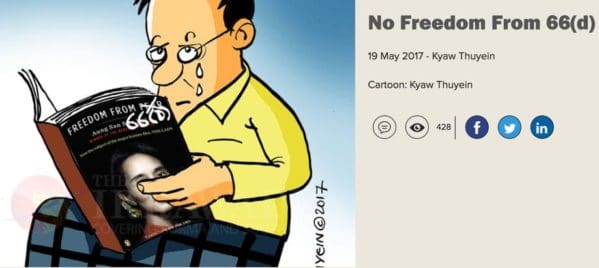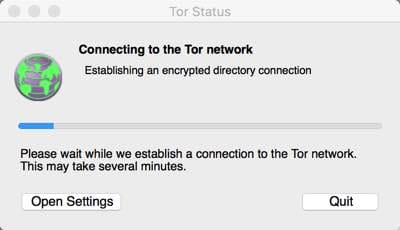No TOR, but Rule 66 instead
I’ve been in Yangon for more than two weeks now, and I’m starting to run into the outer edges of what is allowed here on the internet.
First, Netflix and Apple Music work here. So I’m able to (pretty much) update the apps on my iPhone and download & watch movies. Which is nothing short of amazing, really.
However, connecting to the TOR network seems to be blocked; the login process looks a lot like this:
I don’t know if this is a temporary of a permanent condition. However, in talking to the locals, there is a lot of controversy over a Telecommunications Law, that is known as Rule 66. This basically holds that if you “defame” someone on the internet, that is a crime and you go to jail.
The nefarious thing is that not only can the person claiming they were defamed go running and get someone peremptorily locked up…

Cartoon courtesy of the Irrawaddy blog here in Myanmar.
… but any third party can denounce someone else. So basically, if I see that you’ve said something – anything – online that might be construed as negative, EVEN IF IT’S NOT ABOUT ME, I can go running to the authorities and have you locked up.
From FrontierMyanmar.net:
The previous parliament approved the Telecommunications Law in October 2013 to liberalise the sector and encourage private investment. While the law has certainly achieved that aim – billions of dollars of investment have been pumped into telecoms since licences were awarded to the country’s first two foreign mobile operators in 2014 – its provision on defamation has also been used to stifle comment online, particularly on Facebook.
Section 66(d) of the law forbids anyone from “extorting, coercing, restraining wrongfully, defaming, disturbing, causing undue influence or threatening any person by using any telecommunications networkâ€, and carries a possible prison term of three years.
The section is a stark reminder that the Telecommunications Law is as much a product of the military regime as the Thein Sein era. Reports from as far back as 2008 indicate that the junta wrote the initial draft.
Find the flaw in THAT law. Sheesh.
The good news is that there are a lot of people here that are realizing that the current law, as written, is unwieldy and wide-open to abuse.
The bad news is that rather than junking it, the effort underway seems to be to instead replace it with something that is more narrowly construed to target the press.
Oy.
